InMemoriam
Luminary
★★★★★
- Joined
- Feb 19, 2022
- Posts
- 10,232
thoughts my fellow schizoids  @Schizoidcel @Uncle Death @suigintwo
@Schizoidcel @Uncle Death @suigintwo

 Thomas Harper
Thomas Harper
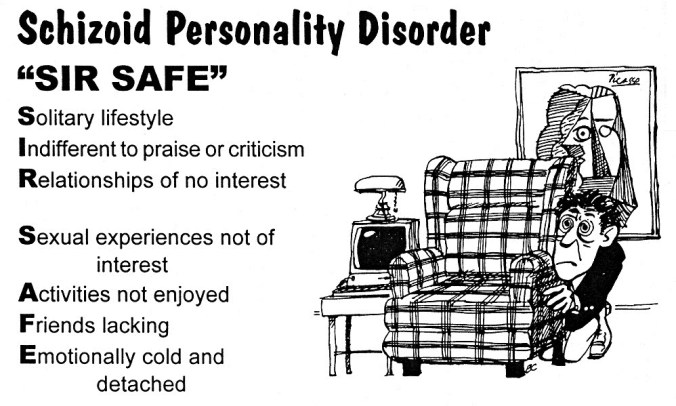
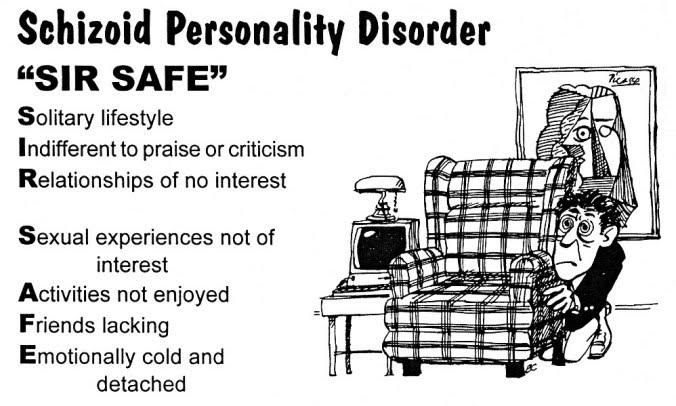 Picture your stereotypical incel, doomer, or shitpost internet commenter. This is probably a youngish white male who is a quiet, awkward nerd in real life. Maybe he dons a neckbeard and wiles away his time playing video games and listening to black metal. When deigning to interact with fellow human beings offline, he only manages to contribute the occasional cynical edgelord quip to the conversation only to bask in the discomfort he’s caused. Online this person becomes a know-it-all on reddit and comment sections, interjecting with snarky non-sequiturs and unsolicited contrarianism in order to cultivate a self-identity as some brand of “agent of chaos.” He declares his atheism and libertarianism at every opportunity all the while belittling others for their own sincerely held beliefs. Yet, these charming underachievers are baffled by their inevitable dearth of friends and potential romantic partners.
Picture your stereotypical incel, doomer, or shitpost internet commenter. This is probably a youngish white male who is a quiet, awkward nerd in real life. Maybe he dons a neckbeard and wiles away his time playing video games and listening to black metal. When deigning to interact with fellow human beings offline, he only manages to contribute the occasional cynical edgelord quip to the conversation only to bask in the discomfort he’s caused. Online this person becomes a know-it-all on reddit and comment sections, interjecting with snarky non-sequiturs and unsolicited contrarianism in order to cultivate a self-identity as some brand of “agent of chaos.” He declares his atheism and libertarianism at every opportunity all the while belittling others for their own sincerely held beliefs. Yet, these charming underachievers are baffled by their inevitable dearth of friends and potential romantic partners.
Here is the thing: I fit a lot of these criteria. I’m a white, millennial (36 years old) male who is on antidepressants. I’m a loner and a quiet nerd. I’m an atheist. I listen to “extreme” music (rap and metal). I’ve been a gamer off-and-on throughout my life. I’m a seething cauldron of cynical, nihilistic snark. Indeed, my online brand – my blog and my Youtube channel – are called The Cynical Philosopher. And, I suppose most of all, I am abstinent without having made any conscious choice.
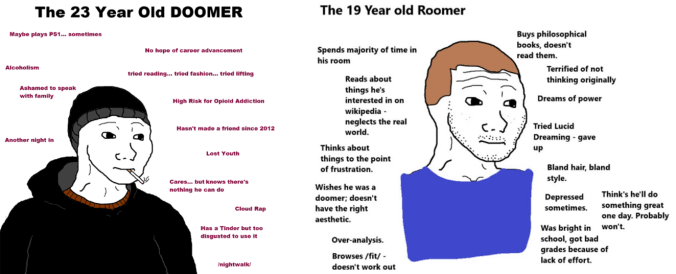
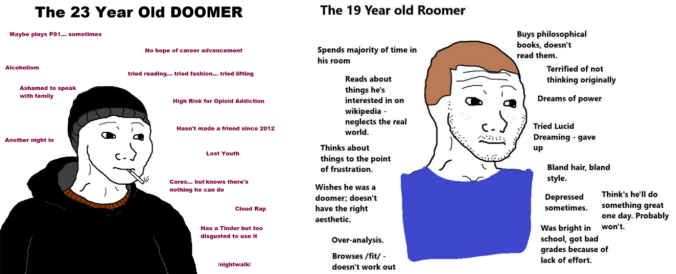
I’m more like the Roomer than the DoomerIt’s not uncommon for people like me to self-diagnose themselves as having Asperger’s Syndrome. I flirted with this idea myself when I was younger. Now, however, the diagnosis of Asperger’s Syndrome has fallen out of favor, replaced with terms like “high-functioning autism,” perhaps in part because all the self-diagnosed Aspergers were using it as an excuse, or even as permission, for their unpleasant dispositions. It may be, however, that some of these people, like myself, are actually experiencing what is known as Schizoid Personality Disorder (SPD), with which I have been formally diagnosed. The DSM-5 gives the following symptoms:
The second analogy I came up with is that interacting with other people, for those of us with SPD, is like trying to put together furniture from IKEA without any instructions. I sometimes feel as if everyone else, maybe sometime between the ages of fifteen and twenty, received those instruction manuals. Although they may not like or enjoy the manual or even fully understand everything in it, they at least know how to follow it for the most part. I, on the other hand, never even received my copy of that instruction manual. Interacting with other people is like trying to solve a riddle wrapped in a mystery inside and enigma, to borrow Churchill’s take on the U.S.S.R. I’m more competent and comfortable solving differential equations than I am making small talk with someone I’ve known my entire life.
Schizoid Personality Disorder falls in one of three clusters of personality disorder:
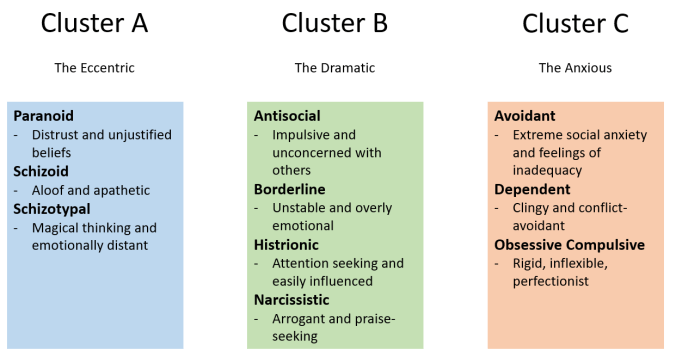
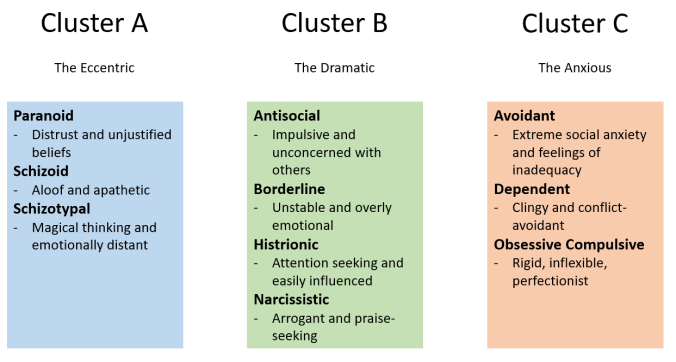 While everyone experiences some degree of each of these descriptions, what makes it a disorder is when that personality trait is excessively manifested to the point that it dwarfs all other traits. That’s why they are called personality disorders: because they are maladaptive expressions of common personality traits.
While everyone experiences some degree of each of these descriptions, what makes it a disorder is when that personality trait is excessively manifested to the point that it dwarfs all other traits. That’s why they are called personality disorders: because they are maladaptive expressions of common personality traits.
At this point the reader might ask themselves how SPD differs from Asperger’s Syndrome or high-functioning Autism. Aren’t those the folks who have a difficult time navigating social interactions? There does seem to be a fair amount of crossover in the department of social ineptitude. The differences, if I might oversimplify once again, is that as far as symptomology, Autism manifests with more of an object and detail focus/obsession, whereas people with SPD are much more likely to be oblivious to their surroundings. The etiology of SPD is also less well understood than Autism, which is known to have genetic/biological underpinnings. With SPD there is some evidence of heritability, but it is often viewed in the literature as more of a social/psychological disorder (as are personality disorders in general).
Schizoid Personality Disorder can appear somewhat paradoxical in that it makes a person both the quintessential loner hermit, eschewing social connection, but also dependent on other people. Those with SPD can be incapable of, or perhaps more accurately uninterested to an unhealthy degree in taking care of themselves. Our apathy toward achievement and attaining prestige or esteem is why folks with SPD are prone to be listless underachievers, even to the point of being indifferent toward everyday concerns. Thus, people with SPD can remain dependent on others even while keeping them at a distance.
Cluster B and C personality disorders typically garner all the press. As such, the cluster A personality disorders exist as unknowns to the wider public. With Schizotypal and Schizoid in particular the “patient” often doesn’t know that they have it, or even that anything is particularly wrong, because they are disinclined to seek the services that might provide them with a diagnosis. My own diagnosis of SPD only came from the therapy I recently began undergoing on account of my substance abuse issues.
Because SPD is not that commonly acknowledged, both in the public and in the scientific literature, I’ve had a difficult time finding decent resources elucidating the subject. Most will simply reiterate the list of symptoms and classifications I’ve given above. Sources I have found that do go into more depth often seem to approach it from a psychoanalytic angle, blaming childhood trauma and parental insufficiencies for the personality disorder. I don’t buy into the psychoanalyses on the subject, at least not completely. I think there is another cause that is much more societal than familial. That’s because modern western civilization itself experiences a society-wide form of Schizoid Personality Disorder.
—
Jean-Paul Sartre famously wrote in his play No Exit that “Hell is other people” (L’enfer, c’est les autres). While the line, and the play as a whole, have been analyzed and reinterpreted innumerable times, my own preferred reading is the most obvious one: that this sentiment speaks to how being in the presence of other people imposes various social expectations on us. Other people are aspects of our environment that we have no control over. When we are alone, we have near complete control over our environment. There are no uncontrolled contingencies to surprise us.
What I have come to realize is that Schizoid Personality Disorder stems at least in part from a hyperactive sense of this control-forfeiture during social situations. This is like with traffic while driving, where what causes road rage is that other drivers do things outside our control and force us to drive in ways not of our choosing. What frustrates us when trying to put together furniture is that it can feel like the parts and pieces are conspiring to stymie our efforts by not properly cooperating the way we want them to.
Our individualistic, pleasure-obsessed culture views social interactions in a similar way to those with SPD. In our modern western civilization, other people are objects in the environment that act as a “point of aggressions” according to German sociologist Hartmut Rosa in his book The Uncontrollability of the World:

On the other hand, what we cannot control are other people (though not for lack of trying). They remain points of aggression, committing violence against our mastery of our own lives by imposing social expectations and duties on us.
For instance, children and aging or disabled family members are viewed as a nuisance which we prefer to pay someone else to address. Having to care for them ourselves would mean infringing on doing what we want to do at all times. This makes the maintenance of close connections, whether family or friends, more bothersome and laborious than rewarding. That’s because relationships are something in our lives that we cannot control or turn towards our own ends. They are gratuitous restrictions that must be thrown off if we are to sustain mastery over our lives.
Strangers, too, are viewed as threats to our sense of control. They do nothing but get in the way, like traffic, and behave in unpredictable ways that frustrate our goals – usually the attainment of pleasure. If all those people just believed the same things I do and behaved the way I wanted them to (so my unconscious assumption goes), it would make the world a better place (for me). A better place by virtue of being under control, the same way that my environment is when I am alone (the preferred environment of us SPD folks).
This individualist culture leads to phenomena known by many different names: ennui (Dostoevsky), anomie (Durkheim), atomization (Houellebecq), alienation (Marx), disenchantment (Weber). This is what the person with SPD feels at all times, and what absolute individualism produces when things and people are only ever reduced to their functionality. This results in a notable lack of resonance, as Hartmut Rosa says of our modern world:
The same goes for other human beings. On top of other people being an unconquered aggression antagonizing the individual’s self-mastery, these interlopers in our consciousness also, as mere objects in the environment, fail to resonate. Relationships with other people become one-sided. We stop caring what we offer them, or how our interactions might help all of us grow and mutually cultivate one another as fully actualized members of a community.
Yet interacting with other people remains a necessity. Thus, they become categorized either as functional or as contingencies that must be controlled and accounted for. The functional are able to supply us with tangible things like food or shelter, with employment or their expertise as doctors and maintenance workers. Outside this, people remain points of aggression, inflicting themselves on our otherwise untrammeled freedom and complete control of our environment. They are the residual exigencies in need of solutions and workarounds.
One way that this has begun to express itself recently is in Wokeness. This is an ambition, perhaps even a Nietzschean will to power, to control the people in our environment by doing away with those who might hold views contrary to our own. Views which are points of aggression that wrest that ideal perfect control from our grasp. If we can regulate what people say and how they behave in the same way we can arrange our offices, bedrooms, and content consumption, then we can achieve that sought-after unimpeded mastery over our lives. The type of mastery that characterizes how we define freedom in modern western civilization.
In others this can manifest in the sort of online behavior characteristic of the incel, doomer, shitposting neckbeard troll I asked you to imagine at the opening of this article. Unable to cope with their lack of mastery, they lapse into their own aggression as an impotent means of effecting some influence on their environment. Perhaps not a controlling influence, but an influence nonetheless. They conceive of themselves the way Tyler Durden from Fight Club did:
—
An article like this one is usually supposed to end with some recommendations of how to remedy the stated problems. Maybe if we all somehow realize what’s happening to us as individuals and as a civilization that we’ll cease trying to control everything, stop and smell the roses, and cure ourselves of the epidemics of anxiety, depression, and loneliness. I don’t think such an awakening is likely. Our ambition to seize control over our environment is as human as our desire to eat and procreate. And even if such insight ever arose, it would likely become just another brand-savvy fad that could be commoditized and marketed to us as a self-help regimen like meditation and mindfulness.
In an article I published on Quillette, I discussed what I call pleasurable beliefs. Our need to feel mastery over our environment fits into this thesis. Acquiring this mastery is tantamount to turning our world into a Nozickian experience machine, where we can jump from one pleasurable subjective state to another. We seek to control our own identity in the same way that we desire control over our physical and social environments.
In that Quillette article I also did not have an optimistic prognosis. I said there that there were three potential solutions, none of which were desirable. The first solution would be to exert more control in hopes of engineering a desired social outcome, the second was to tear everything down a la anarcho-primitivism, and the third was to somehow change human nature itself. The first of these prescriptions sort of defeats the purpose of relinquishing our need for mastery. The second would reintroduce the sorts of environmental points of aggression that humans have struggled for millennia to manage, and I doubt that the vast majority of people would be willing to forfeit their modern comfort and safety in pursuit of Rosa’s resonance. And the third proposed solution is so improbable and unfeasible as to be virtually impossible, and that’s even if most people were on board with such an enterprise.
My conclusion thus remains largely the same as in my Quillette article. The only person we can exert any amount of control over is ourselves. Recognizing our inability to control others, and then trying to be okay with this lack of mastery, is the difficult step. The likelihood of a critical mass of people tolerating, and even finding value in and learning to grow from, the uncontrollability of others, appears miniscule to me. But then, I am fully submerged within the sort of nihilistic pessimism characteristic of Schizoid Personality Disorder, so perhaps I lack the imagination necessary to formulate a workable solution.
Or maybe endeavoring to “find a solution” at all is anathema to what will ultimately bring closure to the issue. That would be great because problems that fix themselves are my favorite kinds of problem.
The Doomer, the Incel, the Shitpost, and our Schizoid Society
1 year ago

Here is the thing: I fit a lot of these criteria. I’m a white, millennial (36 years old) male who is on antidepressants. I’m a loner and a quiet nerd. I’m an atheist. I listen to “extreme” music (rap and metal). I’ve been a gamer off-and-on throughout my life. I’m a seething cauldron of cynical, nihilistic snark. Indeed, my online brand – my blog and my Youtube channel – are called The Cynical Philosopher. And, I suppose most of all, I am abstinent without having made any conscious choice.

I’m more like the Roomer than the Doomer
- Detachment from social relationships with a restricted range of expression of emotions when they are in interpersonal settings. These begin in early adulthood and present in a variety of contexts, such as four of the following:
- Neither desires nor enjoys close relationships
- Chooses solitary activities
- None or little interest in having sexual experiences
- Takes pleasure in few activities
- Lacks close friends or confidants
- Appears indifferent to praise or criticism
- Shows emotional coldness, detachment, or flattened affectivity
- Does not occur exclusively during the course of schizophrenia, a bipolar disorder or depressive disorder with psychotic features, another psychotic disorder, or autism spectrum disorder and is not attributable to the physiological effects of another medical condition
The second analogy I came up with is that interacting with other people, for those of us with SPD, is like trying to put together furniture from IKEA without any instructions. I sometimes feel as if everyone else, maybe sometime between the ages of fifteen and twenty, received those instruction manuals. Although they may not like or enjoy the manual or even fully understand everything in it, they at least know how to follow it for the most part. I, on the other hand, never even received my copy of that instruction manual. Interacting with other people is like trying to solve a riddle wrapped in a mystery inside and enigma, to borrow Churchill’s take on the U.S.S.R. I’m more competent and comfortable solving differential equations than I am making small talk with someone I’ve known my entire life.
Schizoid Personality Disorder falls in one of three clusters of personality disorder:

At this point the reader might ask themselves how SPD differs from Asperger’s Syndrome or high-functioning Autism. Aren’t those the folks who have a difficult time navigating social interactions? There does seem to be a fair amount of crossover in the department of social ineptitude. The differences, if I might oversimplify once again, is that as far as symptomology, Autism manifests with more of an object and detail focus/obsession, whereas people with SPD are much more likely to be oblivious to their surroundings. The etiology of SPD is also less well understood than Autism, which is known to have genetic/biological underpinnings. With SPD there is some evidence of heritability, but it is often viewed in the literature as more of a social/psychological disorder (as are personality disorders in general).
Schizoid Personality Disorder can appear somewhat paradoxical in that it makes a person both the quintessential loner hermit, eschewing social connection, but also dependent on other people. Those with SPD can be incapable of, or perhaps more accurately uninterested to an unhealthy degree in taking care of themselves. Our apathy toward achievement and attaining prestige or esteem is why folks with SPD are prone to be listless underachievers, even to the point of being indifferent toward everyday concerns. Thus, people with SPD can remain dependent on others even while keeping them at a distance.
Cluster B and C personality disorders typically garner all the press. As such, the cluster A personality disorders exist as unknowns to the wider public. With Schizotypal and Schizoid in particular the “patient” often doesn’t know that they have it, or even that anything is particularly wrong, because they are disinclined to seek the services that might provide them with a diagnosis. My own diagnosis of SPD only came from the therapy I recently began undergoing on account of my substance abuse issues.
Because SPD is not that commonly acknowledged, both in the public and in the scientific literature, I’ve had a difficult time finding decent resources elucidating the subject. Most will simply reiterate the list of symptoms and classifications I’ve given above. Sources I have found that do go into more depth often seem to approach it from a psychoanalytic angle, blaming childhood trauma and parental insufficiencies for the personality disorder. I don’t buy into the psychoanalyses on the subject, at least not completely. I think there is another cause that is much more societal than familial. That’s because modern western civilization itself experiences a society-wide form of Schizoid Personality Disorder.
—
Jean-Paul Sartre famously wrote in his play No Exit that “Hell is other people” (L’enfer, c’est les autres). While the line, and the play as a whole, have been analyzed and reinterpreted innumerable times, my own preferred reading is the most obvious one: that this sentiment speaks to how being in the presence of other people imposes various social expectations on us. Other people are aspects of our environment that we have no control over. When we are alone, we have near complete control over our environment. There are no uncontrolled contingencies to surprise us.
What I have come to realize is that Schizoid Personality Disorder stems at least in part from a hyperactive sense of this control-forfeiture during social situations. This is like with traffic while driving, where what causes road rage is that other drivers do things outside our control and force us to drive in ways not of our choosing. What frustrates us when trying to put together furniture is that it can feel like the parts and pieces are conspiring to stymie our efforts by not properly cooperating the way we want them to.
Our individualistic, pleasure-obsessed culture views social interactions in a similar way to those with SPD. In our modern western civilization, other people are objects in the environment that act as a “point of aggressions” according to German sociologist Hartmut Rosa in his book The Uncontrollability of the World:
In many ways we have apprehended and brought under control our physical world, however imperfectly and incompletely. We have successfully reduced and quelled the aggressions of our physical environment. Few people in the western world want for the essentials, like food and water. Most of us have ready access shelter, plumbing, heat, clothing, and even entertainment (i.e. content) at all times. We fear little from nature, with houses to protect us from the weather and wildlife, markets to efficiently supply our provisions, and institutions to guard us (or at least insure us) from natural hazards. We find ourselves without the sorts of struggle and hardship humans evolved to experience, relegating us to the condition of Dostoevsky’s Underground Man.The driving cultural force of that form of life we call “modern” is the idea, the hope and desire, that we can make the world controllable. Yet it is only in encountering the uncontrollable that we really experience the world. Only then do we feel touched, moved, alive.
My hypothesis is this: because we, as late modern human beings, aim to make the world controllable at every level—individual, cultural, institutional, and structural—we invariably encounter the world as a “point of aggressions” or as a series of points of aggression, in other words as a series of objects that we have to know, attain, conquer, master, or exploit. And precisely because of this, “life,” the experience of feeling alive and of truly encountering the world—that which makes resonance possible—always seems to elude us.
…
The sociocultural formation of modernity thus turns out to be, in a way, doubly calibrated for the strategy of making the world controllable. We are structurally compelled (from without) and culturally driven (from within) to turn the world into a point of aggression. It appears to us as something to be known, exploited, attained, appropriated, mastered, and controlled. And often this is not just about bringing things—segments of world—within reach, but about making them faster, easier, cheaper, more efficient, less resistant, more reliably controllable.
Video talks about Dostoevsky’s Notes from Underground and how it relates to trolling and shitposting.
The COVID19 pandemic has been an interesting counterexample to this reduction of natural hazards. However, our reactions to COVID19 – either demanding control over it via masks, vaccines, and so forth, or downplaying its dangers so as to maintain our unrestricted freedom – attests to this need we have for control.On the other hand, what we cannot control are other people (though not for lack of trying). They remain points of aggression, committing violence against our mastery of our own lives by imposing social expectations and duties on us.
For instance, children and aging or disabled family members are viewed as a nuisance which we prefer to pay someone else to address. Having to care for them ourselves would mean infringing on doing what we want to do at all times. This makes the maintenance of close connections, whether family or friends, more bothersome and laborious than rewarding. That’s because relationships are something in our lives that we cannot control or turn towards our own ends. They are gratuitous restrictions that must be thrown off if we are to sustain mastery over our lives.
Strangers, too, are viewed as threats to our sense of control. They do nothing but get in the way, like traffic, and behave in unpredictable ways that frustrate our goals – usually the attainment of pleasure. If all those people just believed the same things I do and behaved the way I wanted them to (so my unconscious assumption goes), it would make the world a better place (for me). A better place by virtue of being under control, the same way that my environment is when I am alone (the preferred environment of us SPD folks).
This individualist culture leads to phenomena known by many different names: ennui (Dostoevsky), anomie (Durkheim), atomization (Houellebecq), alienation (Marx), disenchantment (Weber). This is what the person with SPD feels at all times, and what absolute individualism produces when things and people are only ever reduced to their functionality. This results in a notable lack of resonance, as Hartmut Rosa says of our modern world:
There is no feeling of wonder, of the sublime, of being in communion with another. We are thrown into a world stripped of transcendence. An object in the environment practically disappears until it is needed to perform its function, lest its presence inflict itself on our consciousness. No joy is derived from our experience of the environment. Going to a museum or viewing a natural wonder like the Grand Canyon or Niagara Falls instills nothing, because there is no resonance derived from the experience – no mutual give-and-take, no consciousness of the Hegelian Absolute, no collective effervescence, no internal movement or passion. Art is only a means of cultivating an identity, a brand, and is therefore valued merely for its function as an indicator of one’s identity rather than for its sublimity.None of this means anything to me. It doesn’t matter to me, it doesn’t affect me, and I’m not having any effect on the outside world. This experience is characteristic of a depressive condition, when all axes of resonance have fallen mute and “nothing speaks to us anymore.” This feeling of a loss of world exists independently of the question of how expansive one’s share of the world is. It can arise, individually and collectively, even where—in fact especially where – we have the world technologically, economically, and socially largely in our grasp. Everything out there is dead, gray, empty, and cold, and everything within me is mute and numb, too.
The same goes for other human beings. On top of other people being an unconquered aggression antagonizing the individual’s self-mastery, these interlopers in our consciousness also, as mere objects in the environment, fail to resonate. Relationships with other people become one-sided. We stop caring what we offer them, or how our interactions might help all of us grow and mutually cultivate one another as fully actualized members of a community.
Yet interacting with other people remains a necessity. Thus, they become categorized either as functional or as contingencies that must be controlled and accounted for. The functional are able to supply us with tangible things like food or shelter, with employment or their expertise as doctors and maintenance workers. Outside this, people remain points of aggression, inflicting themselves on our otherwise untrammeled freedom and complete control of our environment. They are the residual exigencies in need of solutions and workarounds.
One way that this has begun to express itself recently is in Wokeness. This is an ambition, perhaps even a Nietzschean will to power, to control the people in our environment by doing away with those who might hold views contrary to our own. Views which are points of aggression that wrest that ideal perfect control from our grasp. If we can regulate what people say and how they behave in the same way we can arrange our offices, bedrooms, and content consumption, then we can achieve that sought-after unimpeded mastery over our lives. The type of mastery that characterizes how we define freedom in modern western civilization.
In others this can manifest in the sort of online behavior characteristic of the incel, doomer, shitposting neckbeard troll I asked you to imagine at the opening of this article. Unable to cope with their lack of mastery, they lapse into their own aggression as an impotent means of effecting some influence on their environment. Perhaps not a controlling influence, but an influence nonetheless. They conceive of themselves the way Tyler Durden from Fight Club did:
When asked by Tyler Durden “if you could be either God’s worst enemy or nothing, which would you choose?” they respond by making themselves the enemy.We’re the middle children of history, man. No purpose or place. We have no Great War. No Great Depression. Our Great War’s a spiritual war. Our Great Depression is our lives. We’ve all been raised on television to believe that one day we’d all be millionaires, and movie gods, and rock stars. But we won’t. And we’re slowly learning that fact. And we’re very, very pissed off.
—
An article like this one is usually supposed to end with some recommendations of how to remedy the stated problems. Maybe if we all somehow realize what’s happening to us as individuals and as a civilization that we’ll cease trying to control everything, stop and smell the roses, and cure ourselves of the epidemics of anxiety, depression, and loneliness. I don’t think such an awakening is likely. Our ambition to seize control over our environment is as human as our desire to eat and procreate. And even if such insight ever arose, it would likely become just another brand-savvy fad that could be commoditized and marketed to us as a self-help regimen like meditation and mindfulness.
In an article I published on Quillette, I discussed what I call pleasurable beliefs. Our need to feel mastery over our environment fits into this thesis. Acquiring this mastery is tantamount to turning our world into a Nozickian experience machine, where we can jump from one pleasurable subjective state to another. We seek to control our own identity in the same way that we desire control over our physical and social environments.
In that Quillette article I also did not have an optimistic prognosis. I said there that there were three potential solutions, none of which were desirable. The first solution would be to exert more control in hopes of engineering a desired social outcome, the second was to tear everything down a la anarcho-primitivism, and the third was to somehow change human nature itself. The first of these prescriptions sort of defeats the purpose of relinquishing our need for mastery. The second would reintroduce the sorts of environmental points of aggression that humans have struggled for millennia to manage, and I doubt that the vast majority of people would be willing to forfeit their modern comfort and safety in pursuit of Rosa’s resonance. And the third proposed solution is so improbable and unfeasible as to be virtually impossible, and that’s even if most people were on board with such an enterprise.
My conclusion thus remains largely the same as in my Quillette article. The only person we can exert any amount of control over is ourselves. Recognizing our inability to control others, and then trying to be okay with this lack of mastery, is the difficult step. The likelihood of a critical mass of people tolerating, and even finding value in and learning to grow from, the uncontrollability of others, appears miniscule to me. But then, I am fully submerged within the sort of nihilistic pessimism characteristic of Schizoid Personality Disorder, so perhaps I lack the imagination necessary to formulate a workable solution.
Or maybe endeavoring to “find a solution” at all is anathema to what will ultimately bring closure to the issue. That would be great because problems that fix themselves are my favorite kinds of problem.
Last edited:






